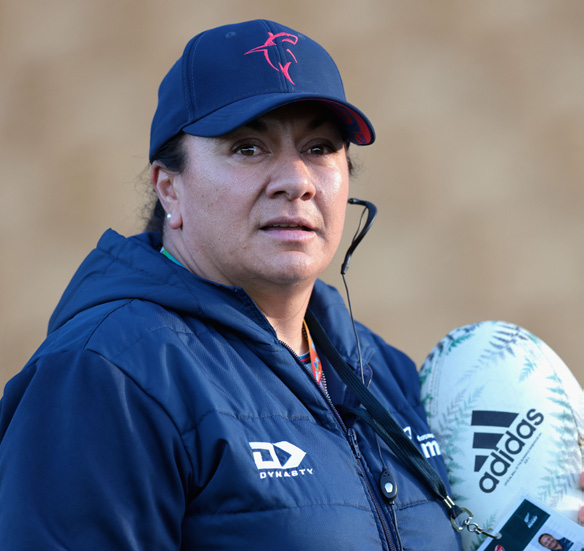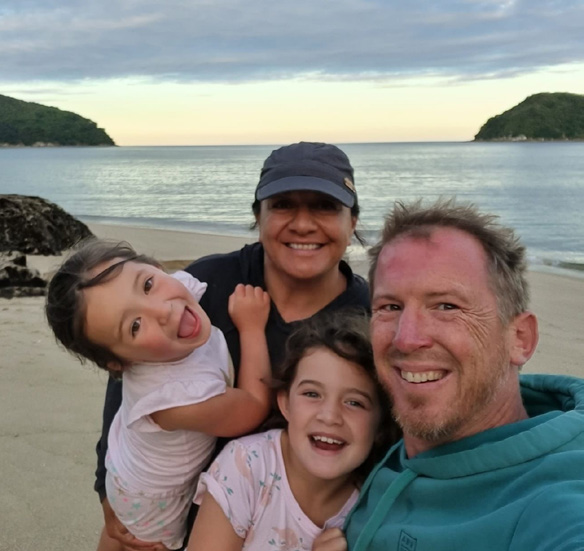Melodie Bosman
Melodie Bosman
- Coach Profile
Melodie Bosman knows how to turn a challenge into an opportunity.
Remote coaching during Super Rugby Aupiki was a big change from what Bosman was used to, valuing face-to-face interaction. But the lessons she learnt from it have helped her greatly in her role as assistant coach for the USA women’s team.
Bosman is Black Fern #119, winning two Rugby World Cups during her time in the black jersey.
She started coaching during her playing days, wanting to give back to the sport that had given her so much.
“I had quite a traumatic childhood, and I found the sport was actually very healing for me,” Bosman says.
“I wanted to be part of that journey for others that may have experienced a similar upbringing to me.”
Based in the Tasman, Bosman began coaching the women’s game in the region in 2017 and became head coach of the Tasman Mako for the 2020 Farah Palmer Cup.
Women’s rugby in Tasman didn’t have the support it needed, and Bosman had to push through, using her passion for the game to keep going.
“That was actually some of the toughest years of my coaching career, but the most rewarding,” she explains.
Within 48 hours of Bosman finishing with Tasman, her phone rang, and World Rugby was on the line. They were looking for a forwards coach for the US women’s Eagles team and one who had experience in the women’s game.
He remembers an English teacher at his high school who empowered his learning by relating everything to surfing. That experience not only made him want to stay in school, but the years have had a lasting effect on the power of being able to relate to others.
“I love nothing more than finding a way to connect with people.”
The greatest thing that coaching has given Scorringe is the lifestyle he wanted to create for himself and his family.
“Absolutely, for me, where it started was helping people. But staying in the game has been about lifestyle, and that’s what keeps me motivated.” Absolutely. First and foremost, it’s about helping all surfers become the best surfers they can be, but to stay in the game, creating a lifestyle for my family to enjoy travelling and the sport is what helps keep me motivated.
As Scorringe’s search for the perfect wave continues, so does the commitment to coach and improve Kiwi surfers on the world’s sporting stage.
“At the time, I think I’d only just felt like I was unwinding, I’d realised I’d just walked away from a team that I’d coached for a long time, and I thought ‘Wow what an opportunity this would be’,” Bosman recalls.
The team had experienced a tough run with coaching and was looking for some stability ahead of the WXV 2 tournament in South Africa.
Bosman’s first thought was her family. A seven-week tour was the longest she’d be away from her two young daughters. But after a chat with her husband, the family knew it would be an amazing opportunity for her.
It was Friday morning when Bosman realised she didn’t have an active passport, Monday afternoon when it arrived, and Wednesday when she flew out, first for the UK and then South Africa.
“I felt like as an assistant coach, you don’t have to worry too much about the upper management, what happens behind the scenes, the administrative part of the game. You can just coach and I really loved being able to do that again,” Bosman says of entering the Eagles camp.
“I felt free to coach, free to be me, not known to these players, so it was just nice to experience that higher level of learning, a strong desire from the players to want to be better, which is really important for them.”
Most of the US women’s team live in England for the opportunity to play in leagues over in the UK, so they aren’t together for most of the year.
“Being able to bring them together, unite them as a team and then shift them was really important for myself and the other two coaches to get that right first,” Bosman explains, knowing gaining their trust was the first step.
“They’re a group of players that just want to be better; they train the house down if they buy into what you’re saying, they’ll work for you 110% every time. But they’re actually a real pleasure to coach.”

Bosman remains working with the team, and will do through to the 2025 Rugby World Cup, joining the team in camps before their campaigns.
“It just takes a lot of planning on my part and setting up programmes for the players, what I want to see, video footage. And they will in turn send clips back of them executing what I’ve asked them to do,” she says of remote coaching.
“So when we get together, which is usually only a week before we have to play in a tournament, I can see where they’re at, and it should be for me just refining and polishing of skills that we’ve been asking them to do.”

Bosman has learnt to be proficient in coaching technology, which began when she worked as an assistant coach in Super Rugby Aupiki during the height of Covid, first with the Blues women under Willie Walker.
“I wasn’t thinking at that time that it was suitable for my life because I’ve got young children…my non-negotiable was obviously my family,” she says.
“If I can’t be the best mum that I can be at home, work wouldn’t work for me, and I felt Aupiki might be too much of a stretch for the commitment.”
But she took the opportunity, and then when Covid struck, all sporting codes had to adapt.
“It was a different environment, but I learned how to coach remotely, as we all needed to communicate with our players remotely using technical advances,” Bosman explains.
“Often when you’re coaching a sport, you’re face to face, you’re on the ground, you can feel the energy of the team, and that was all sort of taken from us at that point.”
She’s learned how valuable face-to-face time is, but she also found different ways to touch base with an athlete.
“Whether it’s FaceTime or a long email, a phone call, keeping those different forms of communication pathways open,” Bosman says.
“As long as they’re feeling supported in the space, that’s really important, and something I didn’t quite appreciate until Covid hit us. So it’s something I use in my coaching now.”
Bosman is grateful for the support she’s had in her coaching career, especially the Te Hāpaitanga programme, which came when she was struggling in the Tasman environment. Her reaction to gaining a spot was tears, knowing the mentorship she could receive through the programme.
Bosman will continue working with the team through the 2025 Rugby World Cup, joining the team in camps before their campaigns.
“It just takes a lot of planning on my part and setting up programmes for the players, what I want to see, video footage. And they will, in turn, send clips back of them executing what I’ve asked them to do,” she says of remote coaching.
“So when we get together, which is usually only a week before we have to play in a tournament, I can see where. “That was at the start of probably the most tumultuous time of my coaching, so having the mentoring through that space, having fellow coaches around me, creating that network was absolutely crucial for me surviving my environment at the time,” she says.
Between coaching a range of teams, she’s learned how important it is to adapt to who and what you have in front of you.
“I think often some coaches can get trapped by that and have their systems in place, and the team that they come into has to work to that system, and often it doesn’t work like that, certainly not in the women’s game,” she says.
“Being able to evolve with the group that’s in front of you, take the time to know your people in the space that you’re in – that’s one of the biggest tools I’ve learned to stay in the game and for it to be sustainable for me.”
Bosman believes looking after yourself is key to being a coach at a high-performance level.
“Know who you are as a person first before you enter into coaching,” is her advice.
“You’ve really got to understand what your non-negotiables are as a person…it’s a tough, gruelling profession to be a high-performance coach. Know yourself, know your worth, and everything else should operate off that, secondary to that.”